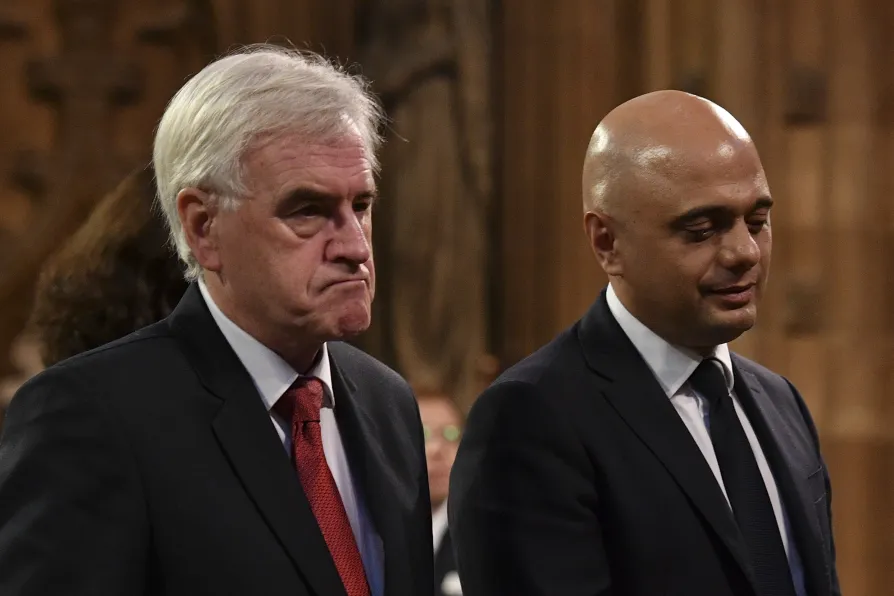
 Chancellor of the Exchequer Sajid Javid (right) and Shadow chancellor John McDonnell
Chancellor of the Exchequer Sajid Javid (right) and Shadow chancellor John McDonnell
SAJID JAVID today tried to steal John McDonnell’s clothes by announcing a raft of public spending — of dimensions which will have convulsed both Gordon Brown and Philip Hammond in terror of IMF sanctions — and thus retreating on the hallowed terrain of fiscal rectitude the Tories have permitted a grown-up discussion about the economics of equity and growth.
We will soon see Javid’s crisp white shirt decorated with a red tie in silent tribute to Labour’s successful strategy in strengthening its public spending narrative at the expense of orthodox austerity economics.
Bouncing back after being boxed in by Boris Johnson, Javid tore up the government’s fiscal rules to promise a boost to public borrowing and infrastructure investment.
His argument that this makes sense in a period of exceptionally low interest rates is a silent pointer to the still powerful effects of the 2008 crash.
Labour’s overall electoral strategy is best served by its supporters not banging on about Brexit.
But the sharp-eyed will have noticed that the Tories are now arguing for a public expenditure policy which nudges closer to the limits that are imposed on EU member states.
Hitherto it has been only the internationalist Lexit left which saw the public spending limits which the EU’s Stability Pact impose as an impermissible negation of the the country’s sovereign power to manage its own fiscal policy.
It is a measure of both the continuing crisis of capitalist confidence, and of the Tories’ desperation, that they have conceded this vital tranche of ideological turf to Labour.
Higher public spending is a Tory scheme to detach slices of Labour voters from their class loyalties, but it is not without its critics in the party.
This faction worries that the more ideologically promiscuous of Johnson’s advisers — who are more focused on winning elections than maintaining continuity with traditional Tory tropes — will lead to disaster.
A key measure of fiscal credibility is the relationship between public expenditure and and government revenues.
In a pitch for the votes of the propertied classes, Javid got an early bid for raising the level at which inheritance tax is paid.
It is on this terrain that the contending forces in this election stake their claim to office.
Note, incidentally, that in an adult discussion about economic policy, the Liberal Democrats manage the impossible trick of appearing both mute and incoherent.
The argument over taxation policy will undoubtedly play an increasing part as the election develops.
Johnson is on record as wanting to raise the higher rate income tax threshold by £30,000 to £80,000. This is self-evidently a measure to lower taxes on the well off.
Spending more money while lowering taxes is a hard trick to pull off and the more cynical (or perhaps the realistic) will doubt the Tories’ intention to follow through on their spending plans.
In this fight Labour has the advantage in that its taxation policy will raise considerably more money.
The Tax Journal reckons that under Labour income tax rates will increase to 45 per cent for income over £80,000 and 50 per cent over £123,000.
Businesses will be levied for staff paid more than £330,000. Capital gains tax will go up to to18 per cent at the basic rate and 28 per cent at the higher rate.
Inheritance tax will go, replaced by a lifetime gift tax at income tax rates on gifts over £125,000.
Corporation tax goes up to 26 per cent and big companies must transfer 10 per cent of their shares to a fund for their employees and the nation.
It is easy to see why the propertied rich are getting anxious.














